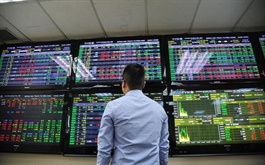Capital market development helps boost transparency in SOEs equitisation
Capital market development helps boost transparency in SOEs equitisation
Capital market development helps State-owned enterprises (SOEs) enhance the transparency of corporate governance, thereby promoting transaction volume on the market and increasing liquidity for state shareholders, an official has said. 
The statement was made by Dang Quyet Tien, director of the Department of Corporate Finance from the Ministry of Finance in a recent interview with Tap chi tai chinh (Finance Magazine).
The mechanisms, policies and legal system on the management and use of state capital and assets in SOEs have been amended and supplemented to ensure close management and transparency, maximising the benefits of the State, removing difficulties and obstacles to speed up the equitisation process and limit the loss of capital and state assets.
“State-owned enterprises have been gradually restructured more effectively, maintaining their role as an important material force of the economy, contributing to economic regulation, macro stability and ensuring major balances of the economy and promote socio-economic development,” Tien said.
“The potential for the development of the capital market in Viet Nam is huge, especially the equitisation of State-owned enterprises. During 2016-2020, with drastic measures, 11 per cent of state capital was transferred to the market, with the remaining being 89 per cent,” said Tien.
Besides such results, Tien pointed out some shortcomings and limitations in the equitisation process including irresponsibility of managers, loose management over operations, low production and business efficiency, capacity being not commensurate with available resources, inefficient projects and slow corporate governance innovation.
“Many SOEs have not kept up with the changing requirements of the market and have not really followed the market mechanism. Investment management, financial management, risk management, thrift practice and anti-waste practice are still insufficient. Production costs are still high. Technology and business management tools are slow to innovate," said Tien.
To link the development of the capital market with the SOE restructuring roadmap for 2021-2025, the Ministry of Finance had proposed a number of solutions such as raising the awareness and courage of leaders.
Leaders of ministries, ministerial-level agencies, Government agencies, chairpersons of People's Committees of provinces and centrally-run cities, chairpersons of members' councils of economic groups, corporations and enterprises are responsible for the approval of restructuring plan of SOEs, organising and supervising the implementation of the plan.




























